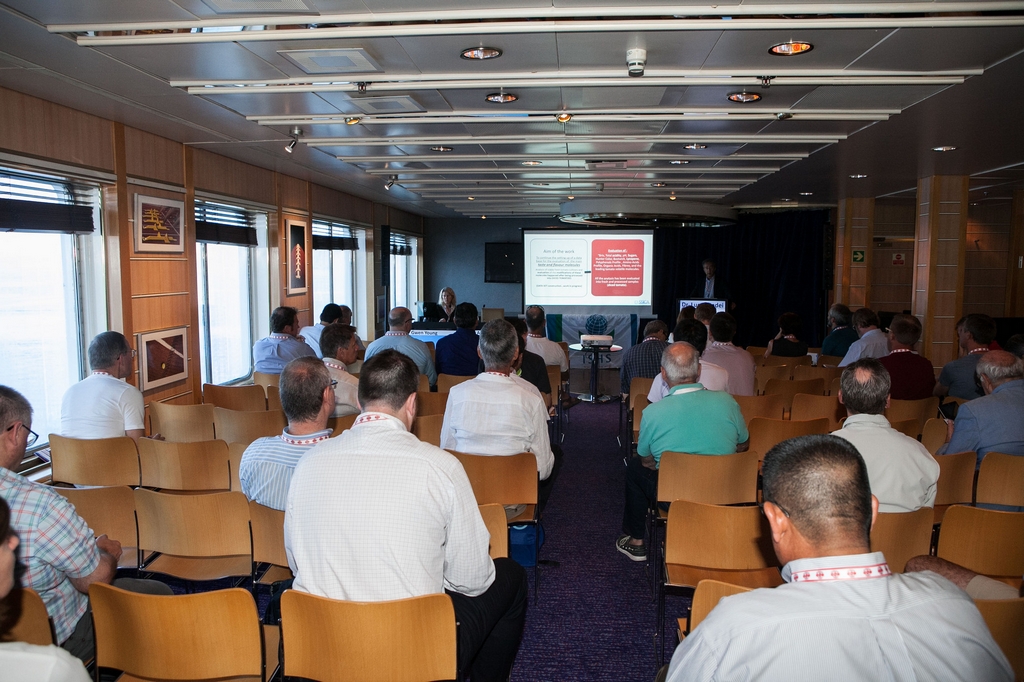Press release
, François-Xavier Branthôme
-
From the article written by Liz Mann, published in Tomato Topics (June 2018 VOL. 28 N°2)
The 15th ISHS Symposium on the Processing Tomato was recently held in Greece from 11-15 June. For the first time, a round table session was also held that enabled seven countries to share their current research issues.
 What was interesting from this is that a number of countries are grappling with soil health issues and also with the management of new pest and disease issues. It is hoped that in the future a greater level of collaboration may occur within the scientific community to help overcome these issues.
What was interesting from this is that a number of countries are grappling with soil health issues and also with the management of new pest and disease issues. It is hoped that in the future a greater level of collaboration may occur within the scientific community to help overcome these issues.
The oral sessions of the ISHS were arranged in six sessions focused on the following topics:
- Agricultural challenges
- Irrigation and breeding
- New tools for quality
- Tomato and health
- Agronomic innovations
- Healthy products for the next generation
Session 1: Agricultural challenges included a presentation on Fusarium oxisporum race 3 with chemical- and bio-fungicides and variety resistance. In summary, the bio-fungicides (Bacillus subtilis and an extract of Reynoutria sachalinensis) did not provide any yield benefits or disease suppression. The fungicide drenches (applied as drenches immediately prior to transplanting) did delay the onset of F3 symptoms, although at harvest time, the incidence level was not reduced. In contrast, variety resistance showed excellent suppression and good yield.
Scientists in both California and Argentina have been evaluating yield and quality from grafted processing tomatoes. Yield increases of between 10-20% have previously been reported in fresh or processing tomatoes. At this stage, grafting for processing tomato production is not economically feasible, but as grafting costs decrease, perhaps with automation, this technology may become a feasible option.
Session 2: Irrigation and breeding included a presentation on biofertilisers, in particular plant growth-promoting rhizobacteria. The solution, applied pre- and post- planting, contained a mixture of Pseudomonas putida, Azotobacter chroococcum, Bacillus circulans and Bacillus megaterium. The treated plants did have an improved biomass and increased yield, although further trials are required to determine the best timing to apply the product.
 In the Agronomic innovations session, the role of cover crops/green manures was discussed. It has been predicted that the Mediterranean region will have an overall reduction in annual rainfall and an increase in temperature over the coming years. This could impact the use of winter cover crops. Hence Lablab purureus (L.) Sweet has been trialled as a dual purpose legume traditionally grown for human consumption, but it can also be grown as a forage crop, green manure or cover crop. Currently, it looks like it might be a promising option for processing tomato growers in Portugal.
In the Agronomic innovations session, the role of cover crops/green manures was discussed. It has been predicted that the Mediterranean region will have an overall reduction in annual rainfall and an increase in temperature over the coming years. This could impact the use of winter cover crops. Hence Lablab purureus (L.) Sweet has been trialled as a dual purpose legume traditionally grown for human consumption, but it can also be grown as a forage crop, green manure or cover crop. Currently, it looks like it might be a promising option for processing tomato growers in Portugal.Hormone-based foliar biostimulants have also been trialled in Argentina. A product stimulant (Stoller) containing gibberellins, auxin and cytokinins, applied in three foliar applications, was shown to increase yield by 8-22%, although not statistically significant in individual trials. When individual trial results were compiled and evaluated through meta-analysis, there was a significant increase in yield.
Source: Tomato Topics (APTRC Newsletter)


 What was interesting from this is that a number of countries are grappling with soil health issues and also with the management of new pest and disease issues. It is hoped that in the future a greater level of collaboration may occur within the scientific community to help overcome these issues.
What was interesting from this is that a number of countries are grappling with soil health issues and also with the management of new pest and disease issues. It is hoped that in the future a greater level of collaboration may occur within the scientific community to help overcome these issues. In the Agronomic innovations session, the role of cover crops/green manures was discussed. It has been predicted that the Mediterranean region will have an overall reduction in annual rainfall and an increase in temperature over the coming years. This could impact the use of winter cover crops. Hence Lablab purureus (L.) Sweet has been trialled as a dual purpose legume traditionally grown for human consumption, but it can also be grown as a forage crop, green manure or cover crop. Currently, it looks like it might be a promising option for processing tomato growers in Portugal.
In the Agronomic innovations session, the role of cover crops/green manures was discussed. It has been predicted that the Mediterranean region will have an overall reduction in annual rainfall and an increase in temperature over the coming years. This could impact the use of winter cover crops. Hence Lablab purureus (L.) Sweet has been trialled as a dual purpose legume traditionally grown for human consumption, but it can also be grown as a forage crop, green manure or cover crop. Currently, it looks like it might be a promising option for processing tomato growers in Portugal.


























